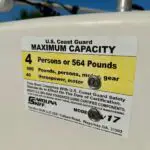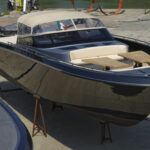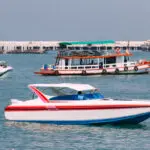Pontoon boats and deck boats are well suited for similar activities and bodies of water, which leaves many boat buyers deciding between the two.
Each has characteristics that make them more suitable for some activities than others. Due to this, the choice of deck boat vs pontoon is often a difficult one.
Here, we explore the subtle differences so you can ask informed questions and make the best choice.
Table of Contents
- What Are the Primary Differences Between Deck Boats and Pontoon Boats?
- The Primary Benefits of Pontoon vs Deck Boats
- Which Boat Has More Space?
- Which Boat Is Easier to Handle on the Water?
- Is a Deck Boat or a Pontoon Boat Faster?
- Which Is the Best Boat for How I Spend the Day on the Water?
- Which Boat Carries More People Onboard?
- Which Costs More? A Deck Boat or a Pontoon Boat?
- Pontoon Boats Require Less Maintenance Than Deck Boats
- Pontoon and Deck Boat Comparison
What Are the Primary Differences Between Deck Boats and Pontoon Boats?
Both boats are great for exploring sheltered waters, enjoying various watersports activities, and bringing a crowd along.
The primary differences between deck boats and pontoon boats are the hull shape and construction material.
Pontoon boats are essentially platforms on top of two floating aluminum hulls, the pontoons, whereas deck boats have single, V-shaped hulls and are most frequently fiberglass construction.
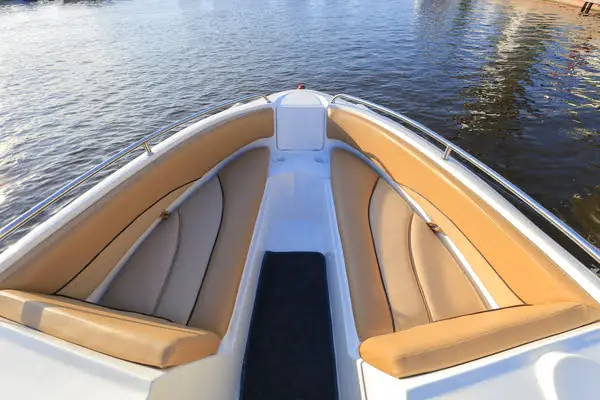
Let’s look at how these differences play out regarding performance, cost, handling, and features…
The Primary Benefits of Pontoon vs Deck Boats
Both boats are excellent choices for gathering a crowd on calm waters and enjoying an array of watersports. Here’s a quick recap of their best qualities:
Pontoon boats:
- Are more stable
- Have a lower starting price point
- Hold more people per length
- Are easier to move around on
- Are more customizable layouts
- Are best suited for socializing and entertaining
Deck boats:
- Are the roomiest V-hull style boats
- Are more agile under cruise speed
- Are faster
- Have the more traditional “boat” look
- Have the option of outboard or inboard engines
- Are best suited for cruising and tow sports
If you are still confused about some of the different applications of these boats, the Automotive Training Center has a great resource that compares many different types of boats.
Which Boat Has More Space?
Both deck boats and pontoon boats are valued for their spaciousness.
But pontoon boats, because of their rectangular base, have the most room. And, because of the completely flat surface, they also have the most walking space and are the easiest to move around.
Deck boats, while roomier than most other molded fiberglass boats have less “walking” space. But they offer generous seating and lounging areas.
Although both deck and pontoon boats lend themselves to a variety of on-the-water activities, pontoon boats are more customizable. When purchasing a new pontoon boat, you will have many floorplan models to choose from.
Deck boats tend to come with fewer floor plan models.
This is because changing the molded seating and storage areas is much more expensive than rearranging the bolt-in-place style seating of a pontoon boat.
Both types of boats have voluminous amounts of storage. Everything from little cubbies for sunscreen and electronics to special-made lockers for skis and fishing poles.
Which Boat Is Easier to Handle on the Water?
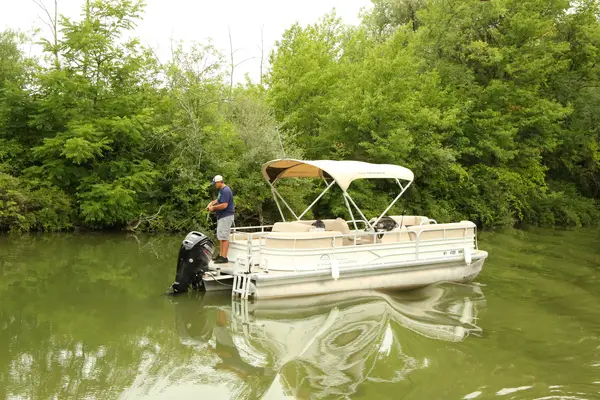
Pontoon boats are much more stable. The two hulls provide a solid surface both at anchor and while cruising.
Because of the V-shape, the deck boat is more tender when stepping aboard, maneuvering around turns, or cruising over choppy water. It will roll more in reaction to movement onboard and in the water.
One of the big differences between these boats is how they ride. The pontoon boat floats over the water and gives a more cushioned ride. However, the deck boat cuts through the water and slices through a wake with a smoother motion.
Pontoon boats will also provide a drier ride while underway than a deck boat. This is because it sits higher out of the water.
When comparing agility under cruising speed, the deck boat tends to be much more nimble. It can make sharp turns and quick reactions. Pontoon boats tend to make wider, gentler turns.
One great example of a nimble boat is the Carolina Skiff. Skiffs tend to be very agile and fast, however, they do come with their own specific list of pros and cons.
However, pontoon boats with twin engines can be much more maneuverable in tight conditions like docking.
They can even turn within their own boat length if the engines have separate controls. Deck boats frequently have a slower response at slower speeds. Some even tend to wander back and forth.
Is a Deck Boat or a Pontoon Boat Faster?
In the end, it depends.
When purchasing either a new pontoon boat or a deck boat, you’ll likely have the option to choose your engine packages.
Almost all pontoon boats are equipped with outboard engines. Often there is a choice to have two outboards, one on each hull. Outboard options range from 25 hp to over 300 hp.
You can easily expect to cruise at 40 to 60 mph on a well-powered pontoon boat, but the average cruise speed for pontoon boats is 30 mph.
Deck boats can accommodate larger engines. In addition, many come with the option of an outboard or an inboard engine.
Because of the larger engines, deck boats are usually faster than pontoon boats; many can reach speeds over 70 mph.
Which Is the Best Boat for How I Spend the Day on the Water?
The subtle differences between deck boats and pontoon boats give each an advantage for the different activities we enjoy on the water.
In broad terms, deck boats are best for action activities, and pontoon boats are best for entertaining. Let’s look at why…
Best Boat For Cruising
Both boats are ideal for cruising around sheltered waterways.
Most deck boat interiors are designed for cruising with all the seats facing forward, which is more comfortable, especially at high speeds.
If cruising around the waterfront at a slower speed, the seating arrangements of a pontoon boat allow for facing each other and enjoying a conversation.
For going fast, the deck boat has more benefits. For cruising slow, the pontoon.
Best Boat for Fishing
If throwing out the lines is the primary goal, most fishermen choose the pontoon boat over the deck boat because there is more room to cast or net your catch.
In addition, the railings make great attachments for rod holders, bait tables, and—for when you are lucky—grills.
If you are set on a deck boat, many models are specifically designed for fishing. They have features like flat bows that you can stand on for casting.
Best Boat for Lounging and Entertaining
Because of their flexible arrangements and roomy platform, Pontoon boats are a natural winner when it comes to pleasing a crowd and just soaking up the day.
And because it is more stable and easy to move around, it can be a more inclusive option for families with young children or older members with mobility issues.
Plus, a pontoon boat provides the space for all the water-related goodies you want to bring aboard, like grills, bars, umbrellas, coolers, slides, paddleboards, and floaties.
But a deck boat, with its deep upholstered lounge seats to spread out on, still makes for a chill day on the water.
Best Boat for Watersports
Just as the pontoon boat was the obvious choice for picnics on the water, the deck boat is more prepared to handle a day of skiing and other pull-behind watersports.
Deck boats are the top choice for a few reasons. They are usually faster, but also, because of their V-hull, they can put up a wake making it more fun for skiers and tubers. The hull also provides a sharper turn, adding to the excitement.
Pontoon boats, given a large enough outboard motor, will also provide plenty of power for tubing and skiing for the casual family outing. Still, the more experienced skier may find the ride underwhelming.
If wakeboarding is the primary attraction, the deck boat will perform more like a ski boat than a pontoon boat.
Which Boat Carries More People Onboard?

For the boat’s length, the pontoon boat fits more people than the deck boat.
However, both boats carry more people than other similarly sized boats.
Large pontoon boats can easily carry 15-18+ people onboard—quite a party. Deck boats, on the other hand, start to handle about 12 people onboard at about 25 ft in length.
Which Costs More? A Deck Boat or a Pontoon Boat?
In general, pontoon boats are more affordable than deck boats when comparing base models.
However, the price of the engine (or engines) can account for nearly 50% of the total cost of the boat.
The more horsepower, the higher the cost. Also, inboard motors, which are an option for deck boats, are usually more expensive than outboard motors.
Besides having options for engines, both deck boats, and pontoon boats come in a range of styles—from utilitarian to luxurious. The line between which type of boat costs more becomes blurred at the upper end of the spectrum.
For starting prices, expect to pay $15K-$60K+ for a pontoon boat and $30K-$80K+ for a deck boat.
If you are daunted by the price of a good deck boat, one way to get around the issue is to buy a used one. Buying a used deck boat from a reputable source is a great option!
Pontoon Boats Require Less Maintenance Than Deck Boats
In addition to the initial costs of the boat and motor, maintenance costs should be considered when determining the actual cost of buying a boat.
Pontoon boats will generally require less maintenance because their aluminum hulls require little care. In contrast, the deck boat’s fiberglass hull requires seasonal buffing and waxing. Fiberglass nicks and dings also require more skill to fix.
The one precaution to note is that aluminum is more corrosive in salt water than in freshwater. Some manufacturers have special saltwater packages, so inquire if you live in a coastal area.
Pontoon and Deck Boat Comparison
Pontoon boats and deck boats are both excellent options for sharing a day on inshore waterways with a large number of people.
The primary benefits of the pontoon are its stability, affordability, and larger passenger capacity.
The primary benefits of the deck boat are its more traditional appearance, better performance for watersports activities, and speed

Growing up in Florida, I’ve been surrounded by saltwater my entire life…and I love sharing my passion with others.
To learn more about why I started Saltwater Mecca, visit the ABOUT page.
Thank you for reading this article. Browse around & have some fun!
